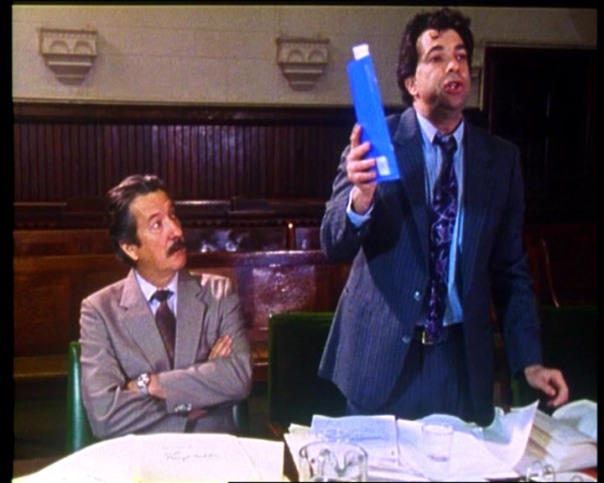
“in summing up, it’s the constitution, it’s Mabo, it’s justice, it’s law,
it’s the vibe and no, that’s it, it’s the vibe…. I rest my case.” **
I’ve been procrastiblogging by compiling a list of the best Australian constitutional law blogs, for both the legal academic and the student/scholar. There are now a number of high quality academic blogs that offer case or issues analysis sometimes within days (or hours) of a major constitutional decision being handed down. Whilst many students are understandably wary of using blogs for research assignments and study, I am confident of the authoritative and scholarly nature of these ones. Read on…
First, (by no means because of my obvious conflict of interest) the Castan Centre for Human Rights Law blog publishes regular posts by professors, experts, practitioners and others, on current human rights and constitutional law issues. Professor Sarah Joseph is the most prolific contributor here, but there are many others.
Melbourne University public law academics post on “Opinions on High“. Look for posts by Professors Cheryl Saunders, Jeremy Gans, Michael Crommelin, Adrienne Stone and Miranda Stewart, along with many others. Each post comes with a handy footnote, compliant with AGLC3 format.*
Professor Helen Irving at Sydney University Law School posts on constitutional law, at A Women’s Constitution She also posts on the Constitutional Reform Unit’s Constitutional Critique, with Professor Anne Twomey.
Over at Adelaide University you will find the wide-ranging Public Law Research Community Blog (some posts are lacking a clear author attribution, so students may have to take care here).
Peter Black at QUT maintains Freedom To Differ, reviewing a wide range of constitutional (and other) issues. Antony Green’s Election Blog is very popular, well, around election time. His psephological insights are well regarded by public law teachers, media commentators and politicians, even if none will admit to it.
Not quite a blog, but with many resources being regularly updated, see the Gilbert and Tobin Public Law Centre at UNSW. Professor George Williams’ regular constitutional law columns in The Age/SMH can be found there along with reams of other constitutional updates. Likewise, the Indigenous Law Centre has updates on Constitutional Reform and Indigenous Recognition, led by Professor Megan Davis. Keep an eye on UK Constitutional Law Blog , with regular posts on Australian public law issues, and Jon Crowe’s Legal Theory Blog, with regular updates on conferences, publications and news.
UPDATE: See the new blog administered by academics at the Gilbert and Tobin Public Law Centre, AUSPUBLAWBLOG, ‘a collaborative blogging project bringing you expert commentary and analysis on recent cases and legislative change as well as updates on the latest research and scholarship in Australian public law’.
Special mention must go to Law Geek Down Under and Shit Judges Say, each very different, but united in their respective authors’ persistence and their anonymity. Another honorable mention goes to Malcolm Farnsworth, who maintains Australian Politics, which is bursting with legal-political analysis of all issues constitutional and parliamentary. Worth a visit! If you are following constitutional law on Twitter, look for people tweeting #auscon and #auslaw. A full list of nearly 100 Australian law blogs is found on this blog at Finding Australian Law Blogs.
All of the blogs I have noted are of high quality, and are immediately and freely accessible. They are written by known experts in their field. The authors are contributing to these blogs as an opportunity to work through contemporary developments, issues or ideas by writing. Their posts are different from a journal article or book chapter, however the posts will often form part of a larger body of research that the writer may work into a peer reviewed journal article or some other ‘recognised’ academic output.
I have been fortunate to have been working with two colleagues, Kate Galloway and Kristoffer Greaves, on the utility of social media to broaden the forms of communication of scholarly work. One of our papers is available here. The more recent companion piece is here, and Kris gives some context to them both here.
This collection of constitutional law resources illustrates how academic leaders are using blogs as a component in a larger research and teaching strategy. Do you think blogging is a valuable part of academic work? Do you rely on blogs in your legal research? Leave your comments below.
Notes
* A footnote for a blog post should look like this: Cheryl Saunders, ‘Reflections on the Local Government Referendum That Wasn’t’ on Opinions on High (23 September 2013) < http://blogs.unimelb.edu.au/opinionsonhigh/2013/09/23/saunders-local-government-referendum >
** Image from The Castle (1997) Working Dog, from http://www.michaeldvd.com.au/Reviews/Reviews.asp?ID=5323
Melissa Castan teaches constitutional law at Monash University; at @MsCastan on twitter and www.law.monash.edu.au/staff/mcastan.html at work. Her most recent publications are Federal Constitutional Law: A Contemporary View, with Professor Sarah Joseph, and Proof of Birth, on birth registration issues, co-edited with Dr Paula Gerber.
UPDATE: materials from the 2015 Public Law Teachers Workshop are located here and the tweets from the day are storified here.
[…] It’s more than the vibe; blogging the Constitution […]
… [Trackback]
[…] Find More Informations here: amicaecuriae.com/2013/09/27/its-more-than-the-vibe/ […]